Analysis of Teachers' Role in Science Teaching at Primary School Level
VerifiedAdded on 2021/05/31
|18
|4435
|24
Report
AI Summary
This report delves into the pivotal role of teachers in teaching science at the primary school level, highlighting its impact on students' future professional practice. The report addresses the historical challenges in science education, particularly the shift towards inquiry-based learning and the importance of teachers' attitudes and self-efficacy. It references key research, including studies by Ward & Roden, Harlen, and others, to analyze how teachers' beliefs and pedagogical skills affect student interest and learning outcomes. The report emphasizes the significance of teacher training, professional development, and the development of positive attitudes towards science to create a productive learning environment. It further explores the influence of teacher behavior, feedback, and collaboration with other educators, drawing on Albert Bandura's social cognitive theory. The annotated bibliography provides a review of relevant academic journals, summarizing research on teacher education, curriculum implementation, and the impact of professional development programs on teacher attitudes and practices.
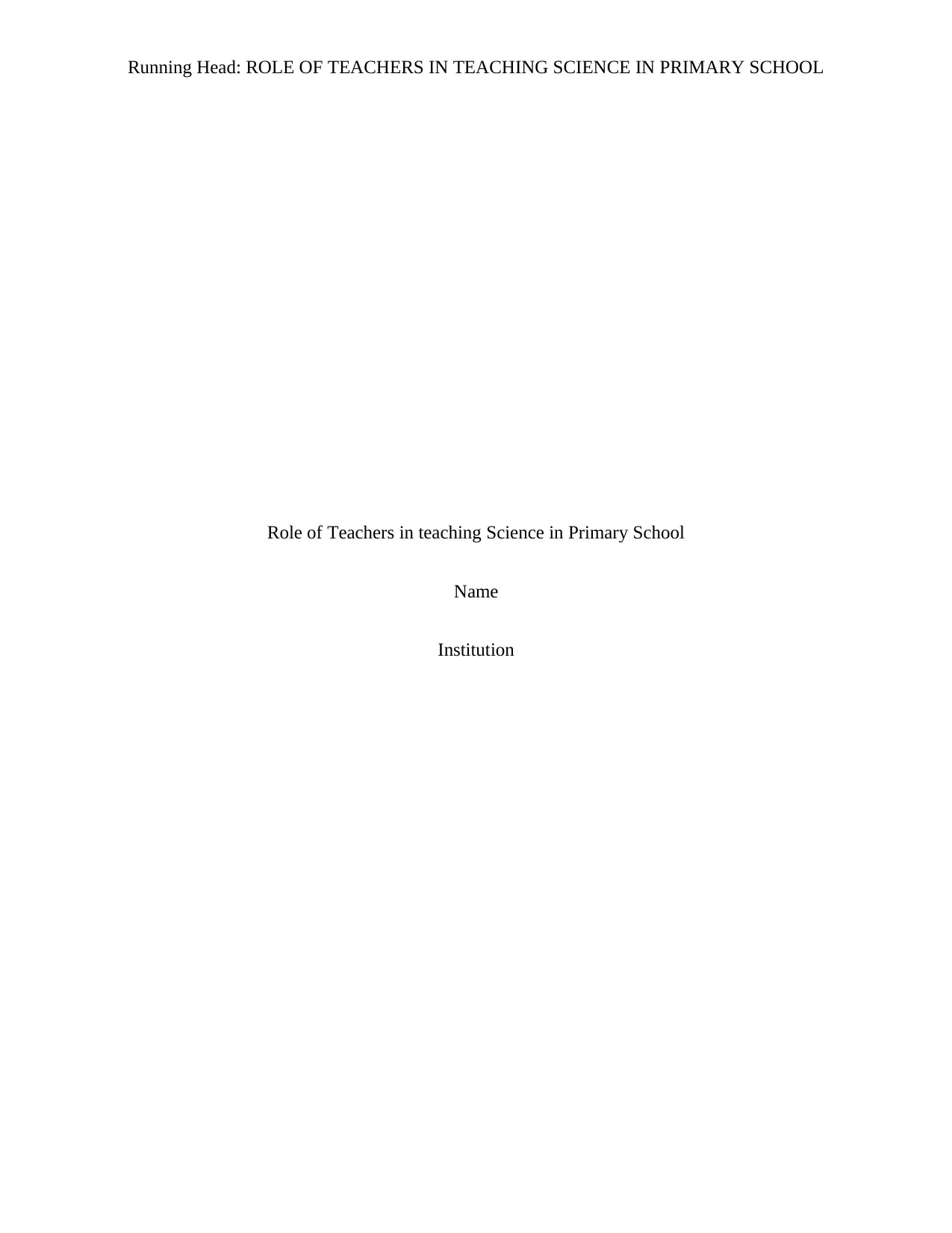
Running Head: ROLE OF TEACHERS IN TEACHING SCIENCE IN PRIMARY SCHOOL
Role of Teachers in teaching Science in Primary School
Name
Institution
Role of Teachers in teaching Science in Primary School
Name
Institution
Paraphrase This Document
Need a fresh take? Get an instant paraphrase of this document with our AI Paraphraser
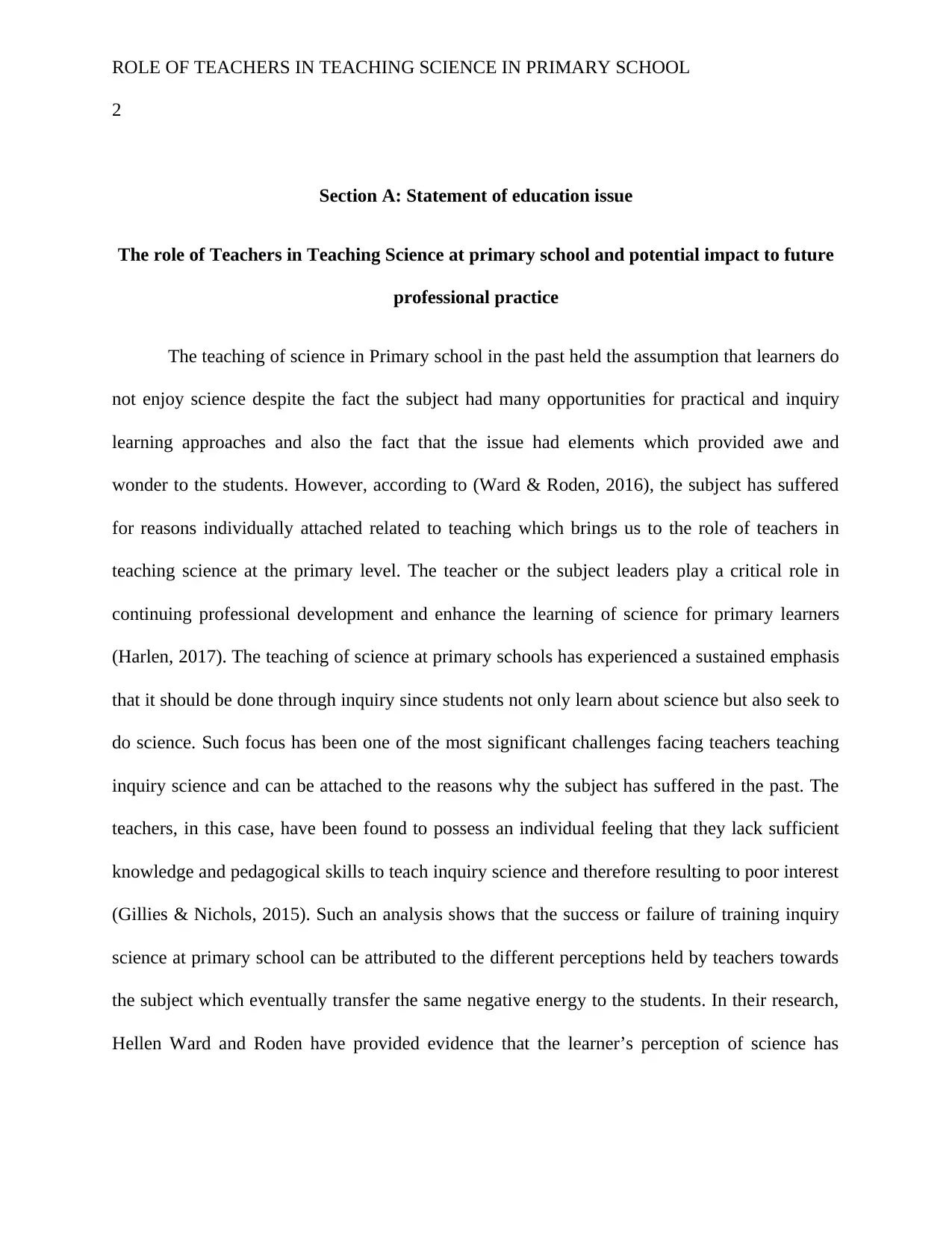
ROLE OF TEACHERS IN TEACHING SCIENCE IN PRIMARY SCHOOL
2
Section A: Statement of education issue
The role of Teachers in Teaching Science at primary school and potential impact to future
professional practice
The teaching of science in Primary school in the past held the assumption that learners do
not enjoy science despite the fact the subject had many opportunities for practical and inquiry
learning approaches and also the fact that the issue had elements which provided awe and
wonder to the students. However, according to (Ward & Roden, 2016), the subject has suffered
for reasons individually attached related to teaching which brings us to the role of teachers in
teaching science at the primary level. The teacher or the subject leaders play a critical role in
continuing professional development and enhance the learning of science for primary learners
(Harlen, 2017). The teaching of science at primary schools has experienced a sustained emphasis
that it should be done through inquiry since students not only learn about science but also seek to
do science. Such focus has been one of the most significant challenges facing teachers teaching
inquiry science and can be attached to the reasons why the subject has suffered in the past. The
teachers, in this case, have been found to possess an individual feeling that they lack sufficient
knowledge and pedagogical skills to teach inquiry science and therefore resulting to poor interest
(Gillies & Nichols, 2015). Such an analysis shows that the success or failure of training inquiry
science at primary school can be attributed to the different perceptions held by teachers towards
the subject which eventually transfer the same negative energy to the students. In their research,
Hellen Ward and Roden have provided evidence that the learner’s perception of science has
2
Section A: Statement of education issue
The role of Teachers in Teaching Science at primary school and potential impact to future
professional practice
The teaching of science in Primary school in the past held the assumption that learners do
not enjoy science despite the fact the subject had many opportunities for practical and inquiry
learning approaches and also the fact that the issue had elements which provided awe and
wonder to the students. However, according to (Ward & Roden, 2016), the subject has suffered
for reasons individually attached related to teaching which brings us to the role of teachers in
teaching science at the primary level. The teacher or the subject leaders play a critical role in
continuing professional development and enhance the learning of science for primary learners
(Harlen, 2017). The teaching of science at primary schools has experienced a sustained emphasis
that it should be done through inquiry since students not only learn about science but also seek to
do science. Such focus has been one of the most significant challenges facing teachers teaching
inquiry science and can be attached to the reasons why the subject has suffered in the past. The
teachers, in this case, have been found to possess an individual feeling that they lack sufficient
knowledge and pedagogical skills to teach inquiry science and therefore resulting to poor interest
(Gillies & Nichols, 2015). Such an analysis shows that the success or failure of training inquiry
science at primary school can be attributed to the different perceptions held by teachers towards
the subject which eventually transfer the same negative energy to the students. In their research,
Hellen Ward and Roden have provided evidence that the learner’s perception of science has
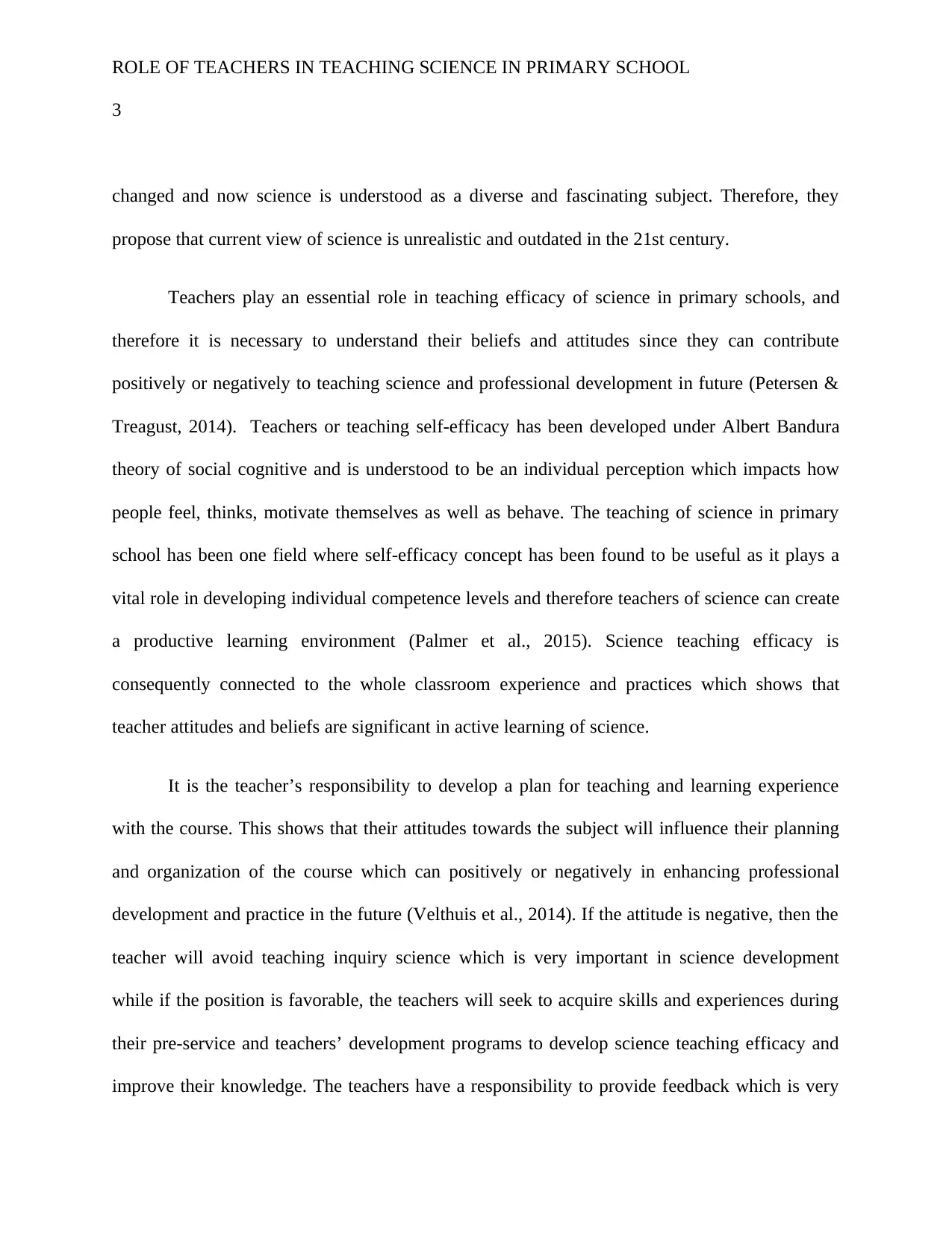
ROLE OF TEACHERS IN TEACHING SCIENCE IN PRIMARY SCHOOL
3
changed and now science is understood as a diverse and fascinating subject. Therefore, they
propose that current view of science is unrealistic and outdated in the 21st century.
Teachers play an essential role in teaching efficacy of science in primary schools, and
therefore it is necessary to understand their beliefs and attitudes since they can contribute
positively or negatively to teaching science and professional development in future (Petersen &
Treagust, 2014). Teachers or teaching self-efficacy has been developed under Albert Bandura
theory of social cognitive and is understood to be an individual perception which impacts how
people feel, thinks, motivate themselves as well as behave. The teaching of science in primary
school has been one field where self-efficacy concept has been found to be useful as it plays a
vital role in developing individual competence levels and therefore teachers of science can create
a productive learning environment (Palmer et al., 2015). Science teaching efficacy is
consequently connected to the whole classroom experience and practices which shows that
teacher attitudes and beliefs are significant in active learning of science.
It is the teacher’s responsibility to develop a plan for teaching and learning experience
with the course. This shows that their attitudes towards the subject will influence their planning
and organization of the course which can positively or negatively in enhancing professional
development and practice in the future (Velthuis et al., 2014). If the attitude is negative, then the
teacher will avoid teaching inquiry science which is very important in science development
while if the position is favorable, the teachers will seek to acquire skills and experiences during
their pre-service and teachers’ development programs to develop science teaching efficacy and
improve their knowledge. The teachers have a responsibility to provide feedback which is very
3
changed and now science is understood as a diverse and fascinating subject. Therefore, they
propose that current view of science is unrealistic and outdated in the 21st century.
Teachers play an essential role in teaching efficacy of science in primary schools, and
therefore it is necessary to understand their beliefs and attitudes since they can contribute
positively or negatively to teaching science and professional development in future (Petersen &
Treagust, 2014). Teachers or teaching self-efficacy has been developed under Albert Bandura
theory of social cognitive and is understood to be an individual perception which impacts how
people feel, thinks, motivate themselves as well as behave. The teaching of science in primary
school has been one field where self-efficacy concept has been found to be useful as it plays a
vital role in developing individual competence levels and therefore teachers of science can create
a productive learning environment (Palmer et al., 2015). Science teaching efficacy is
consequently connected to the whole classroom experience and practices which shows that
teacher attitudes and beliefs are significant in active learning of science.
It is the teacher’s responsibility to develop a plan for teaching and learning experience
with the course. This shows that their attitudes towards the subject will influence their planning
and organization of the course which can positively or negatively in enhancing professional
development and practice in the future (Velthuis et al., 2014). If the attitude is negative, then the
teacher will avoid teaching inquiry science which is very important in science development
while if the position is favorable, the teachers will seek to acquire skills and experiences during
their pre-service and teachers’ development programs to develop science teaching efficacy and
improve their knowledge. The teachers have a responsibility to provide feedback which is very
⊘ This is a preview!⊘
Do you want full access?
Subscribe today to unlock all pages.

Trusted by 1+ million students worldwide
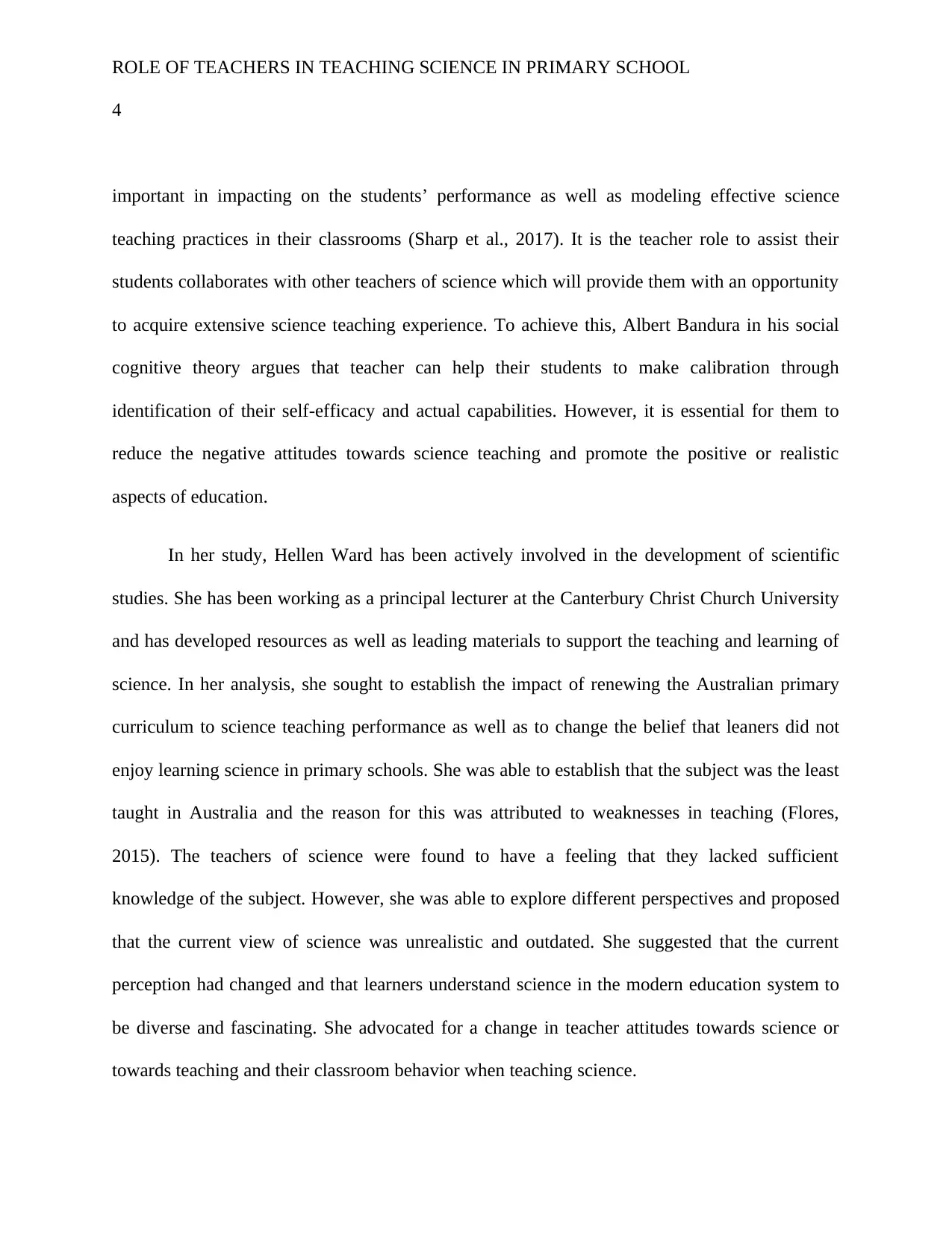
ROLE OF TEACHERS IN TEACHING SCIENCE IN PRIMARY SCHOOL
4
important in impacting on the students’ performance as well as modeling effective science
teaching practices in their classrooms (Sharp et al., 2017). It is the teacher role to assist their
students collaborates with other teachers of science which will provide them with an opportunity
to acquire extensive science teaching experience. To achieve this, Albert Bandura in his social
cognitive theory argues that teacher can help their students to make calibration through
identification of their self-efficacy and actual capabilities. However, it is essential for them to
reduce the negative attitudes towards science teaching and promote the positive or realistic
aspects of education.
In her study, Hellen Ward has been actively involved in the development of scientific
studies. She has been working as a principal lecturer at the Canterbury Christ Church University
and has developed resources as well as leading materials to support the teaching and learning of
science. In her analysis, she sought to establish the impact of renewing the Australian primary
curriculum to science teaching performance as well as to change the belief that leaners did not
enjoy learning science in primary schools. She was able to establish that the subject was the least
taught in Australia and the reason for this was attributed to weaknesses in teaching (Flores,
2015). The teachers of science were found to have a feeling that they lacked sufficient
knowledge of the subject. However, she was able to explore different perspectives and proposed
that the current view of science was unrealistic and outdated. She suggested that the current
perception had changed and that learners understand science in the modern education system to
be diverse and fascinating. She advocated for a change in teacher attitudes towards science or
towards teaching and their classroom behavior when teaching science.
4
important in impacting on the students’ performance as well as modeling effective science
teaching practices in their classrooms (Sharp et al., 2017). It is the teacher role to assist their
students collaborates with other teachers of science which will provide them with an opportunity
to acquire extensive science teaching experience. To achieve this, Albert Bandura in his social
cognitive theory argues that teacher can help their students to make calibration through
identification of their self-efficacy and actual capabilities. However, it is essential for them to
reduce the negative attitudes towards science teaching and promote the positive or realistic
aspects of education.
In her study, Hellen Ward has been actively involved in the development of scientific
studies. She has been working as a principal lecturer at the Canterbury Christ Church University
and has developed resources as well as leading materials to support the teaching and learning of
science. In her analysis, she sought to establish the impact of renewing the Australian primary
curriculum to science teaching performance as well as to change the belief that leaners did not
enjoy learning science in primary schools. She was able to establish that the subject was the least
taught in Australia and the reason for this was attributed to weaknesses in teaching (Flores,
2015). The teachers of science were found to have a feeling that they lacked sufficient
knowledge of the subject. However, she was able to explore different perspectives and proposed
that the current view of science was unrealistic and outdated. She suggested that the current
perception had changed and that learners understand science in the modern education system to
be diverse and fascinating. She advocated for a change in teacher attitudes towards science or
towards teaching and their classroom behavior when teaching science.
Paraphrase This Document
Need a fresh take? Get an instant paraphrase of this document with our AI Paraphraser
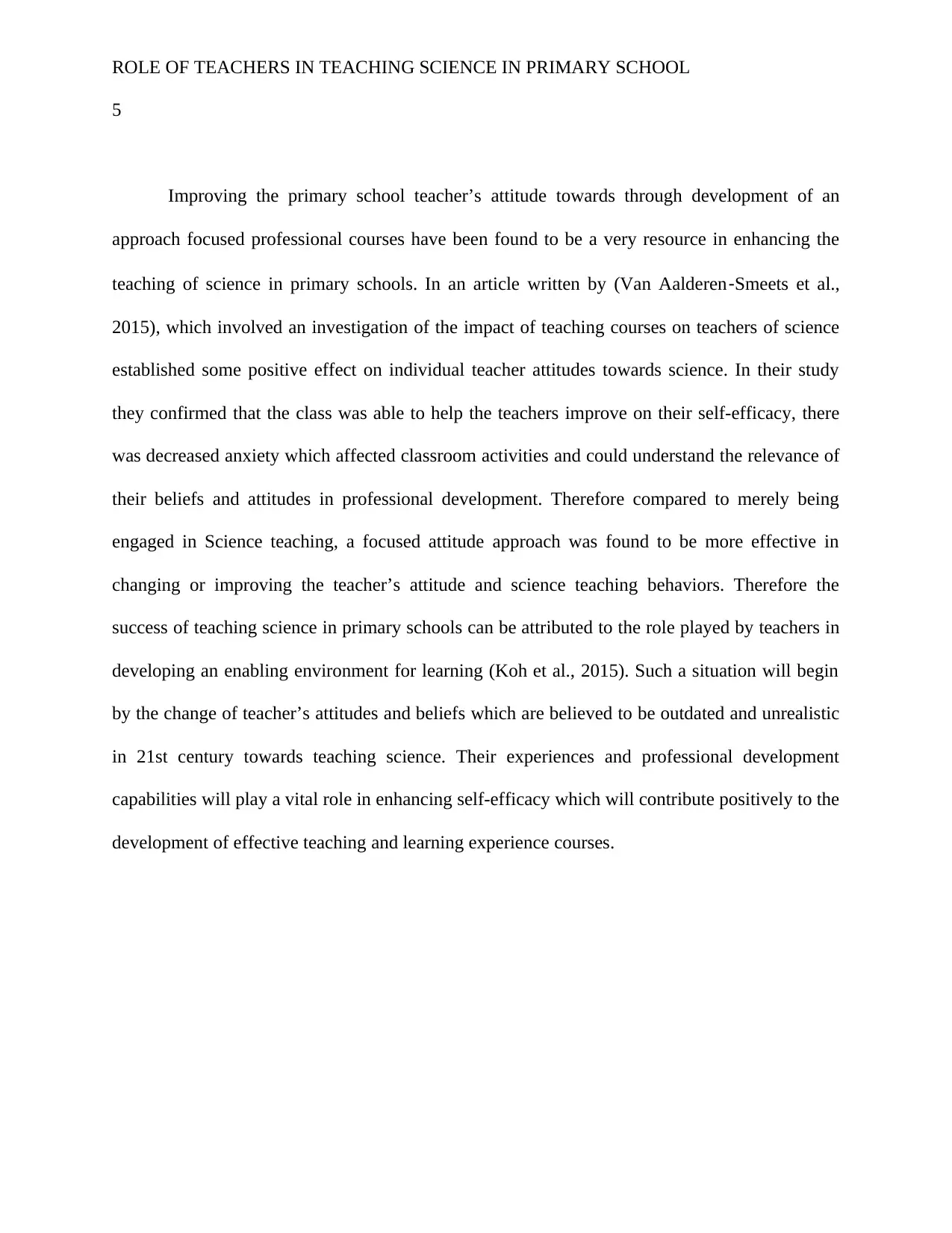
ROLE OF TEACHERS IN TEACHING SCIENCE IN PRIMARY SCHOOL
5
Improving the primary school teacher’s attitude towards through development of an
approach focused professional courses have been found to be a very resource in enhancing the
teaching of science in primary schools. In an article written by (Van Aalderen‐Smeets et al.,
2015), which involved an investigation of the impact of teaching courses on teachers of science
established some positive effect on individual teacher attitudes towards science. In their study
they confirmed that the class was able to help the teachers improve on their self-efficacy, there
was decreased anxiety which affected classroom activities and could understand the relevance of
their beliefs and attitudes in professional development. Therefore compared to merely being
engaged in Science teaching, a focused attitude approach was found to be more effective in
changing or improving the teacher’s attitude and science teaching behaviors. Therefore the
success of teaching science in primary schools can be attributed to the role played by teachers in
developing an enabling environment for learning (Koh et al., 2015). Such a situation will begin
by the change of teacher’s attitudes and beliefs which are believed to be outdated and unrealistic
in 21st century towards teaching science. Their experiences and professional development
capabilities will play a vital role in enhancing self-efficacy which will contribute positively to the
development of effective teaching and learning experience courses.
5
Improving the primary school teacher’s attitude towards through development of an
approach focused professional courses have been found to be a very resource in enhancing the
teaching of science in primary schools. In an article written by (Van Aalderen‐Smeets et al.,
2015), which involved an investigation of the impact of teaching courses on teachers of science
established some positive effect on individual teacher attitudes towards science. In their study
they confirmed that the class was able to help the teachers improve on their self-efficacy, there
was decreased anxiety which affected classroom activities and could understand the relevance of
their beliefs and attitudes in professional development. Therefore compared to merely being
engaged in Science teaching, a focused attitude approach was found to be more effective in
changing or improving the teacher’s attitude and science teaching behaviors. Therefore the
success of teaching science in primary schools can be attributed to the role played by teachers in
developing an enabling environment for learning (Koh et al., 2015). Such a situation will begin
by the change of teacher’s attitudes and beliefs which are believed to be outdated and unrealistic
in 21st century towards teaching science. Their experiences and professional development
capabilities will play a vital role in enhancing self-efficacy which will contribute positively to the
development of effective teaching and learning experience courses.
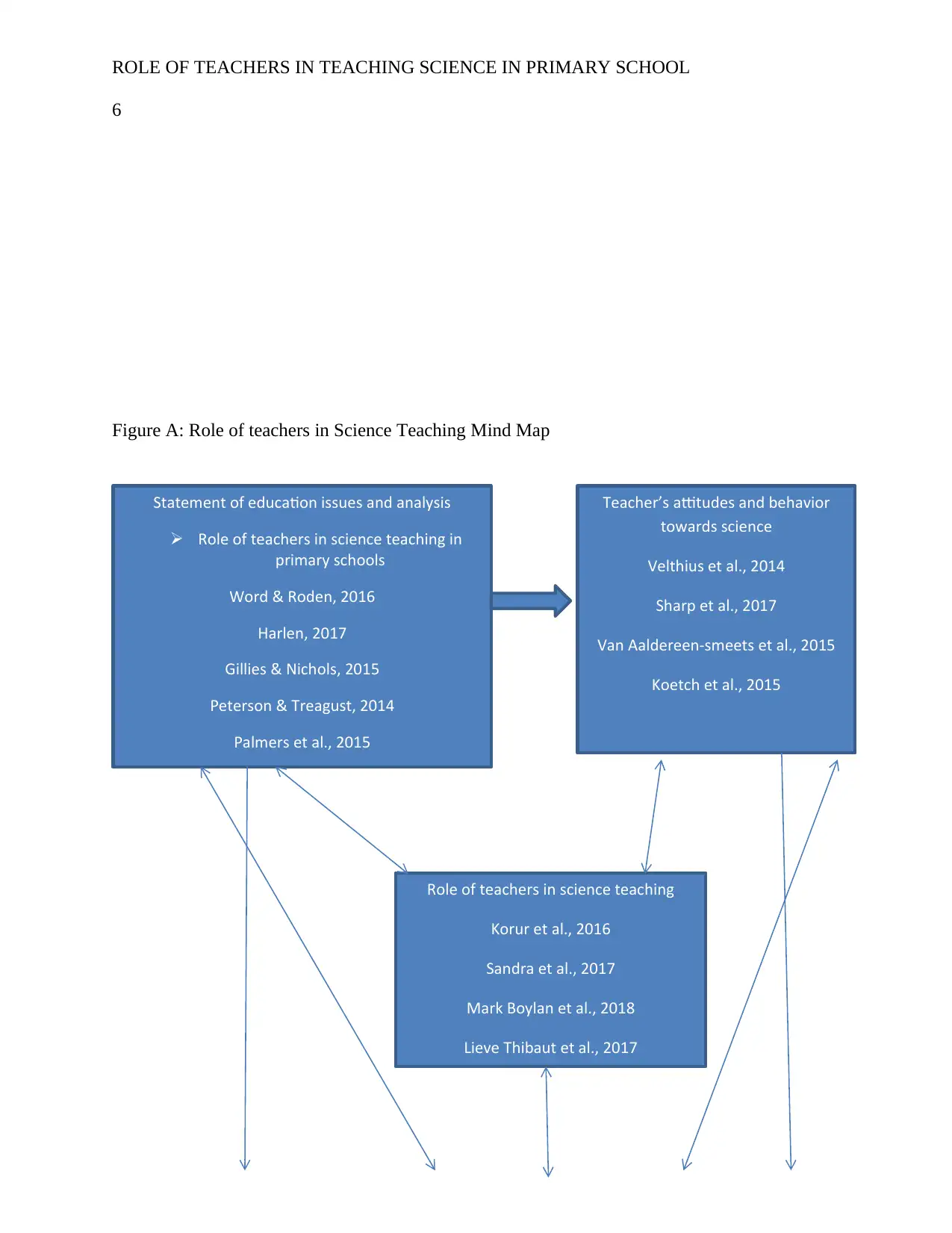
ROLE OF TEACHERS IN TEACHING SCIENCE IN PRIMARY SCHOOL
6
Figure A: Role of teachers in Science Teaching Mind Map
Statement of education issues and analysis
Role of teachers in science teaching in
primary schools
Word & Roden, 2016
Harlen, 2017
Gillies & Nichols, 2015
Peterson & Treagust, 2014
Palmers et al., 2015
Teacher’s attitudes and behavior
towards science
Velthius et al., 2014
Sharp et al., 2017
Van Aaldereen-smeets et al., 2015
Koetch et al., 2015
Role of teachers in science teaching
Korur et al., 2016
Sandra et al., 2017
Mark Boylan et al., 2018
Lieve Thibaut et al., 2017
6
Figure A: Role of teachers in Science Teaching Mind Map
Statement of education issues and analysis
Role of teachers in science teaching in
primary schools
Word & Roden, 2016
Harlen, 2017
Gillies & Nichols, 2015
Peterson & Treagust, 2014
Palmers et al., 2015
Teacher’s attitudes and behavior
towards science
Velthius et al., 2014
Sharp et al., 2017
Van Aaldereen-smeets et al., 2015
Koetch et al., 2015
Role of teachers in science teaching
Korur et al., 2016
Sandra et al., 2017
Mark Boylan et al., 2018
Lieve Thibaut et al., 2017
⊘ This is a preview!⊘
Do you want full access?
Subscribe today to unlock all pages.

Trusted by 1+ million students worldwide
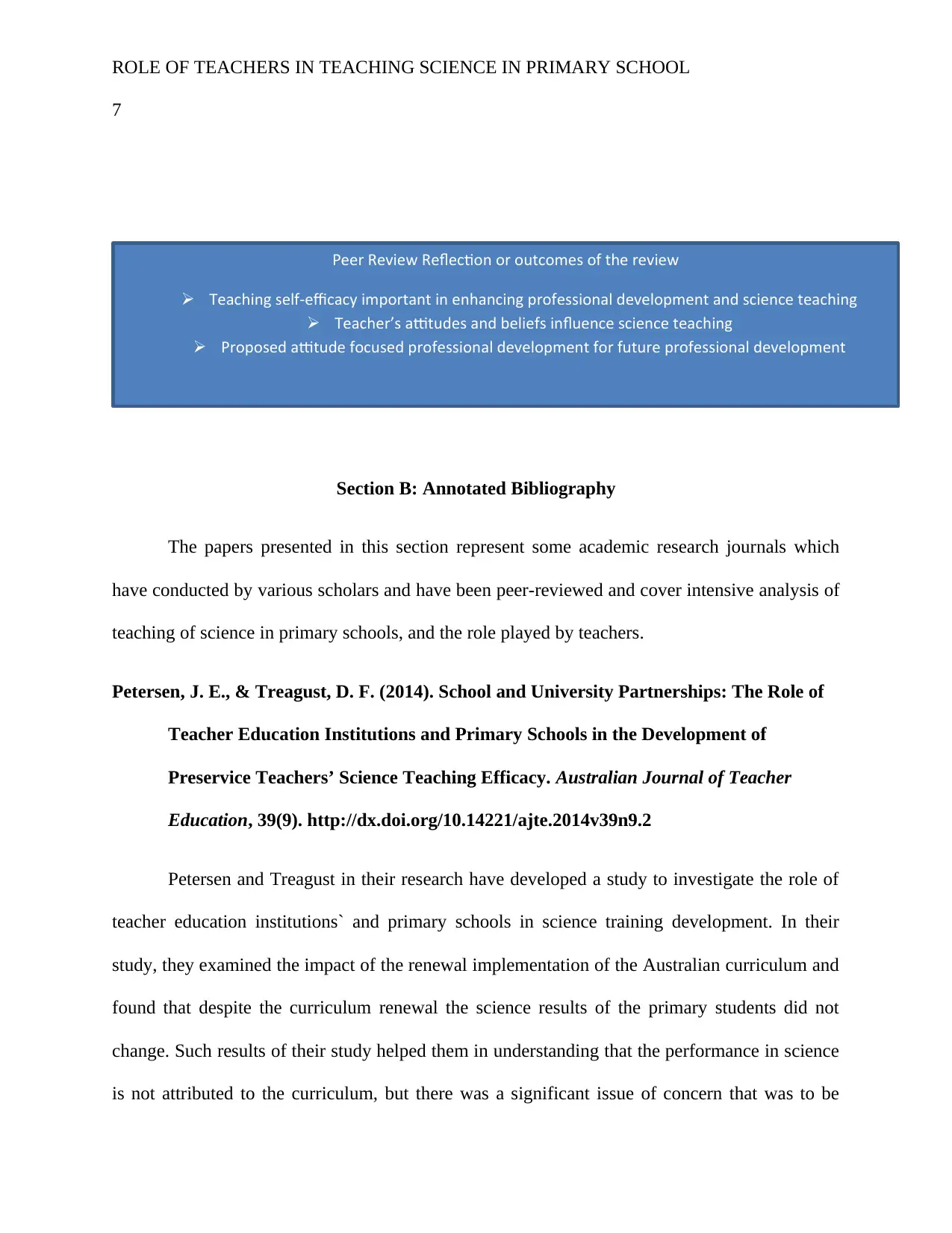
ROLE OF TEACHERS IN TEACHING SCIENCE IN PRIMARY SCHOOL
7
Section B: Annotated Bibliography
The papers presented in this section represent some academic research journals which
have conducted by various scholars and have been peer-reviewed and cover intensive analysis of
teaching of science in primary schools, and the role played by teachers.
Petersen, J. E., & Treagust, D. F. (2014). School and University Partnerships: The Role of
Teacher Education Institutions and Primary Schools in the Development of
Preservice Teachers’ Science Teaching Efficacy. Australian Journal of Teacher
Education, 39(9). http://dx.doi.org/10.14221/ajte.2014v39n9.2
Petersen and Treagust in their research have developed a study to investigate the role of
teacher education institutions` and primary schools in science training development. In their
study, they examined the impact of the renewal implementation of the Australian curriculum and
found that despite the curriculum renewal the science results of the primary students did not
change. Such results of their study helped them in understanding that the performance in science
is not attributed to the curriculum, but there was a significant issue of concern that was to be
Peer Review Reflection or outcomes of the review
Teaching self-efficacy important in enhancing professional development and science teaching
Teacher’s attitudes and beliefs influence science teaching
Proposed attitude focused professional development for future professional development
7
Section B: Annotated Bibliography
The papers presented in this section represent some academic research journals which
have conducted by various scholars and have been peer-reviewed and cover intensive analysis of
teaching of science in primary schools, and the role played by teachers.
Petersen, J. E., & Treagust, D. F. (2014). School and University Partnerships: The Role of
Teacher Education Institutions and Primary Schools in the Development of
Preservice Teachers’ Science Teaching Efficacy. Australian Journal of Teacher
Education, 39(9). http://dx.doi.org/10.14221/ajte.2014v39n9.2
Petersen and Treagust in their research have developed a study to investigate the role of
teacher education institutions` and primary schools in science training development. In their
study, they examined the impact of the renewal implementation of the Australian curriculum and
found that despite the curriculum renewal the science results of the primary students did not
change. Such results of their study helped them in understanding that the performance in science
is not attributed to the curriculum, but there was a significant issue of concern that was to be
Peer Review Reflection or outcomes of the review
Teaching self-efficacy important in enhancing professional development and science teaching
Teacher’s attitudes and beliefs influence science teaching
Proposed attitude focused professional development for future professional development
Paraphrase This Document
Need a fresh take? Get an instant paraphrase of this document with our AI Paraphraser
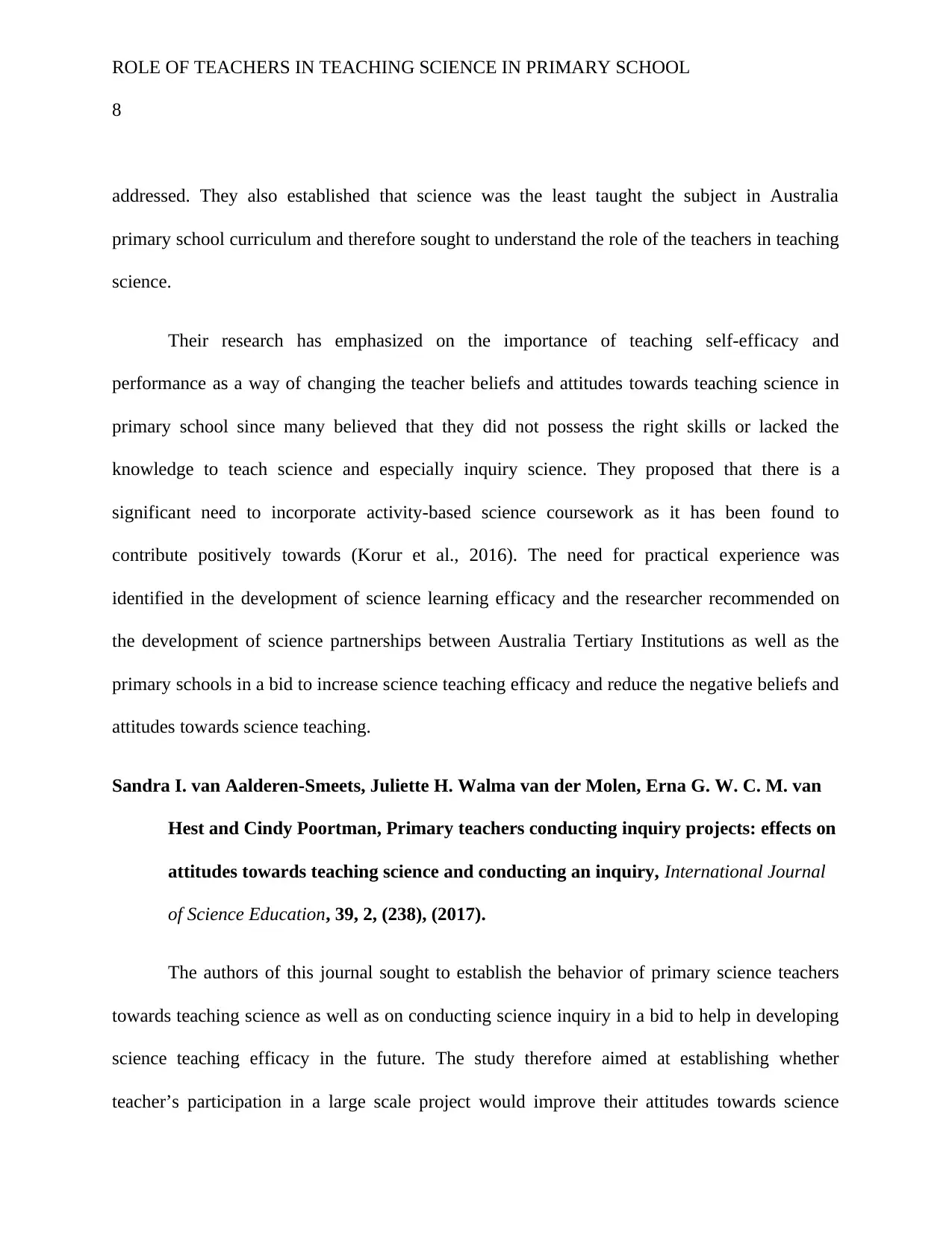
ROLE OF TEACHERS IN TEACHING SCIENCE IN PRIMARY SCHOOL
8
addressed. They also established that science was the least taught the subject in Australia
primary school curriculum and therefore sought to understand the role of the teachers in teaching
science.
Their research has emphasized on the importance of teaching self-efficacy and
performance as a way of changing the teacher beliefs and attitudes towards teaching science in
primary school since many believed that they did not possess the right skills or lacked the
knowledge to teach science and especially inquiry science. They proposed that there is a
significant need to incorporate activity-based science coursework as it has been found to
contribute positively towards (Korur et al., 2016). The need for practical experience was
identified in the development of science learning efficacy and the researcher recommended on
the development of science partnerships between Australia Tertiary Institutions as well as the
primary schools in a bid to increase science teaching efficacy and reduce the negative beliefs and
attitudes towards science teaching.
Sandra I. van Aalderen-Smeets, Juliette H. Walma van der Molen, Erna G. W. C. M. van
Hest and Cindy Poortman, Primary teachers conducting inquiry projects: effects on
attitudes towards teaching science and conducting an inquiry, International Journal
of Science Education, 39, 2, (238), (2017).
The authors of this journal sought to establish the behavior of primary science teachers
towards teaching science as well as on conducting science inquiry in a bid to help in developing
science teaching efficacy in the future. The study therefore aimed at establishing whether
teacher’s participation in a large scale project would improve their attitudes towards science
8
addressed. They also established that science was the least taught the subject in Australia
primary school curriculum and therefore sought to understand the role of the teachers in teaching
science.
Their research has emphasized on the importance of teaching self-efficacy and
performance as a way of changing the teacher beliefs and attitudes towards teaching science in
primary school since many believed that they did not possess the right skills or lacked the
knowledge to teach science and especially inquiry science. They proposed that there is a
significant need to incorporate activity-based science coursework as it has been found to
contribute positively towards (Korur et al., 2016). The need for practical experience was
identified in the development of science learning efficacy and the researcher recommended on
the development of science partnerships between Australia Tertiary Institutions as well as the
primary schools in a bid to increase science teaching efficacy and reduce the negative beliefs and
attitudes towards science teaching.
Sandra I. van Aalderen-Smeets, Juliette H. Walma van der Molen, Erna G. W. C. M. van
Hest and Cindy Poortman, Primary teachers conducting inquiry projects: effects on
attitudes towards teaching science and conducting an inquiry, International Journal
of Science Education, 39, 2, (238), (2017).
The authors of this journal sought to establish the behavior of primary science teachers
towards teaching science as well as on conducting science inquiry in a bid to help in developing
science teaching efficacy in the future. The study therefore aimed at establishing whether
teacher’s participation in a large scale project would improve their attitudes towards science
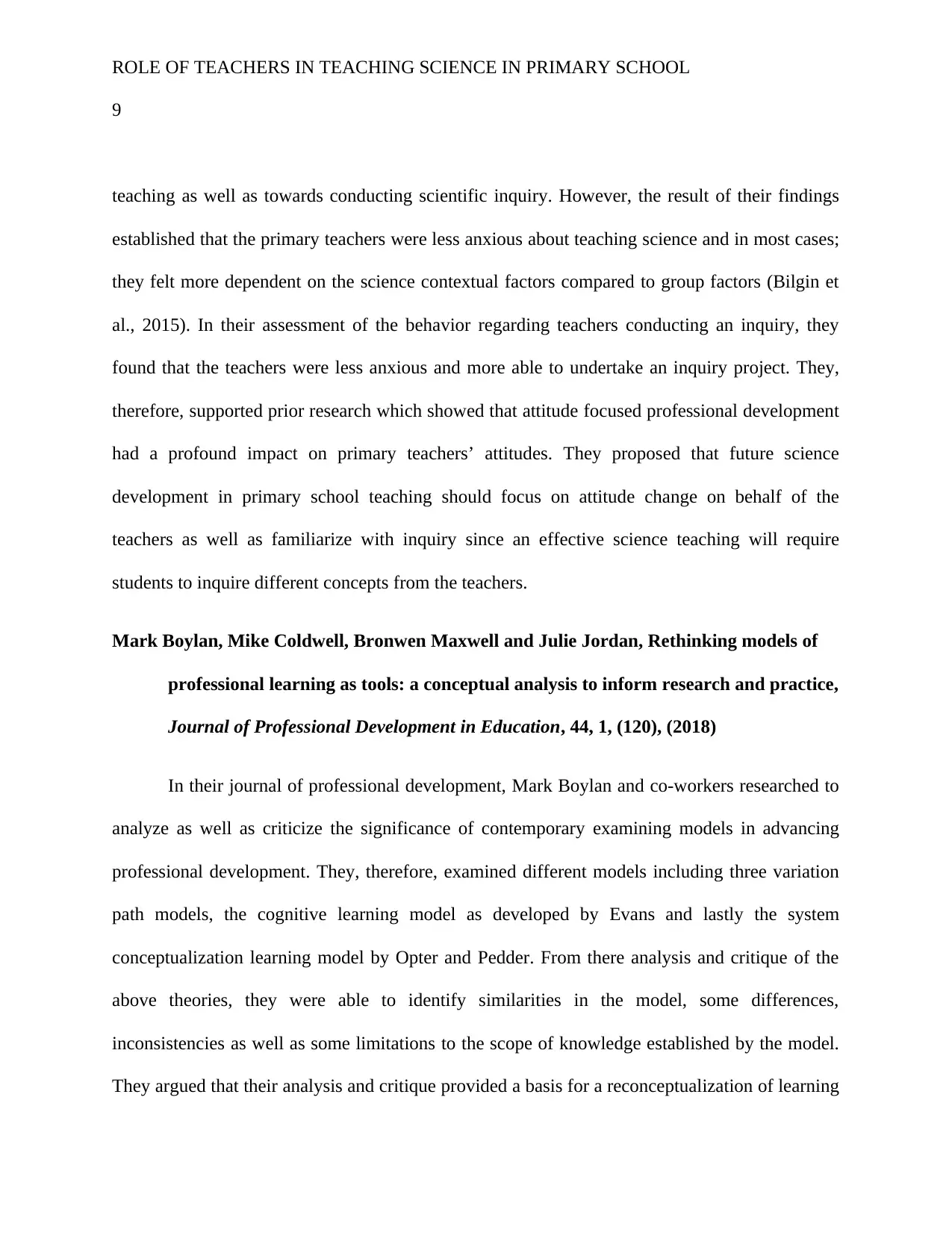
ROLE OF TEACHERS IN TEACHING SCIENCE IN PRIMARY SCHOOL
9
teaching as well as towards conducting scientific inquiry. However, the result of their findings
established that the primary teachers were less anxious about teaching science and in most cases;
they felt more dependent on the science contextual factors compared to group factors (Bilgin et
al., 2015). In their assessment of the behavior regarding teachers conducting an inquiry, they
found that the teachers were less anxious and more able to undertake an inquiry project. They,
therefore, supported prior research which showed that attitude focused professional development
had a profound impact on primary teachers’ attitudes. They proposed that future science
development in primary school teaching should focus on attitude change on behalf of the
teachers as well as familiarize with inquiry since an effective science teaching will require
students to inquire different concepts from the teachers.
Mark Boylan, Mike Coldwell, Bronwen Maxwell and Julie Jordan, Rethinking models of
professional learning as tools: a conceptual analysis to inform research and practice,
Journal of Professional Development in Education, 44, 1, (120), (2018)
In their journal of professional development, Mark Boylan and co-workers researched to
analyze as well as criticize the significance of contemporary examining models in advancing
professional development. They, therefore, examined different models including three variation
path models, the cognitive learning model as developed by Evans and lastly the system
conceptualization learning model by Opter and Pedder. From there analysis and critique of the
above theories, they were able to identify similarities in the model, some differences,
inconsistencies as well as some limitations to the scope of knowledge established by the model.
They argued that their analysis and critique provided a basis for a reconceptualization of learning
9
teaching as well as towards conducting scientific inquiry. However, the result of their findings
established that the primary teachers were less anxious about teaching science and in most cases;
they felt more dependent on the science contextual factors compared to group factors (Bilgin et
al., 2015). In their assessment of the behavior regarding teachers conducting an inquiry, they
found that the teachers were less anxious and more able to undertake an inquiry project. They,
therefore, supported prior research which showed that attitude focused professional development
had a profound impact on primary teachers’ attitudes. They proposed that future science
development in primary school teaching should focus on attitude change on behalf of the
teachers as well as familiarize with inquiry since an effective science teaching will require
students to inquire different concepts from the teachers.
Mark Boylan, Mike Coldwell, Bronwen Maxwell and Julie Jordan, Rethinking models of
professional learning as tools: a conceptual analysis to inform research and practice,
Journal of Professional Development in Education, 44, 1, (120), (2018)
In their journal of professional development, Mark Boylan and co-workers researched to
analyze as well as criticize the significance of contemporary examining models in advancing
professional development. They, therefore, examined different models including three variation
path models, the cognitive learning model as developed by Evans and lastly the system
conceptualization learning model by Opter and Pedder. From there analysis and critique of the
above theories, they were able to identify similarities in the model, some differences,
inconsistencies as well as some limitations to the scope of knowledge established by the model.
They argued that their analysis and critique provided a basis for a reconceptualization of learning
⊘ This is a preview!⊘
Do you want full access?
Subscribe today to unlock all pages.

Trusted by 1+ million students worldwide
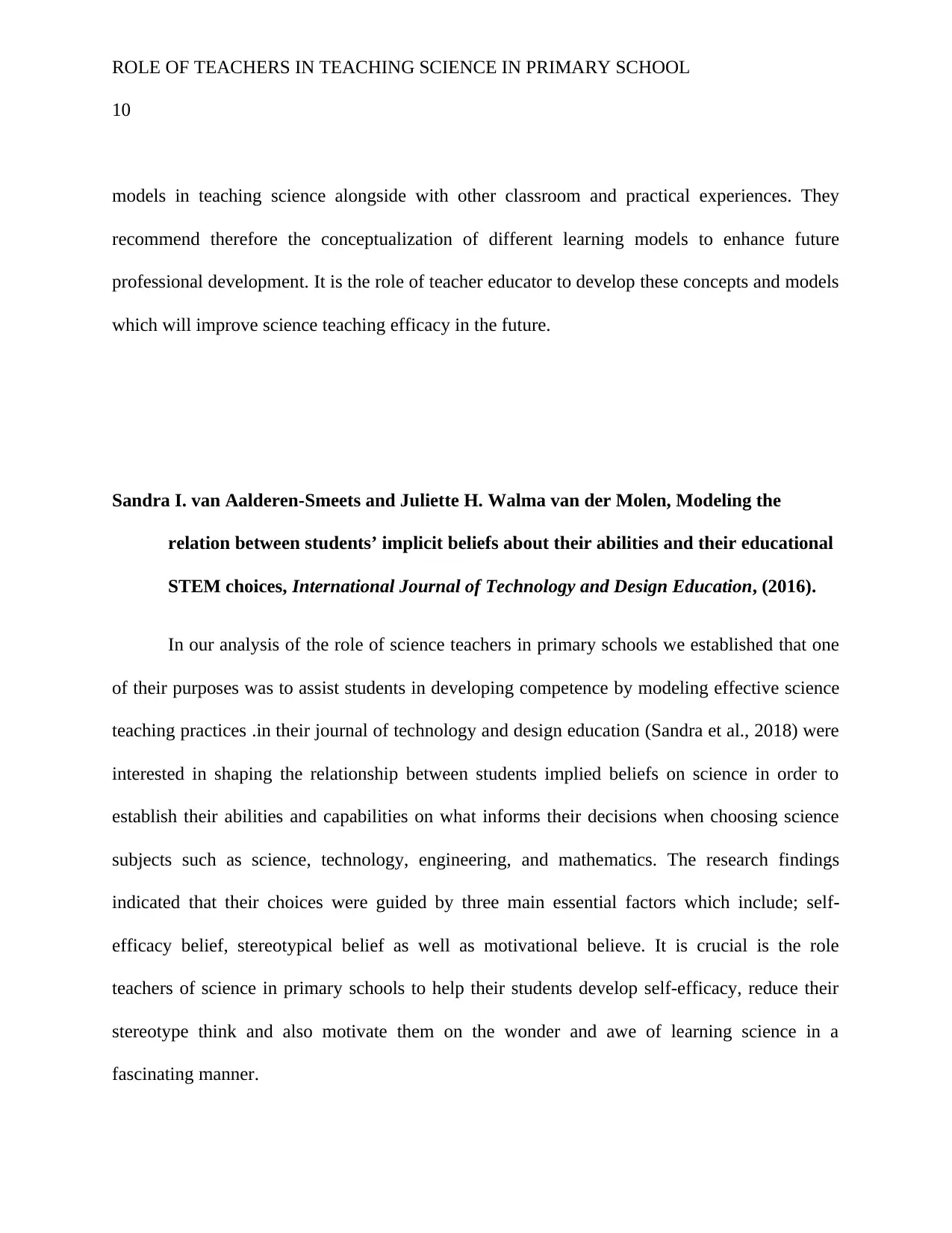
ROLE OF TEACHERS IN TEACHING SCIENCE IN PRIMARY SCHOOL
10
models in teaching science alongside with other classroom and practical experiences. They
recommend therefore the conceptualization of different learning models to enhance future
professional development. It is the role of teacher educator to develop these concepts and models
which will improve science teaching efficacy in the future.
Sandra I. van Aalderen-Smeets and Juliette H. Walma van der Molen, Modeling the
relation between students’ implicit beliefs about their abilities and their educational
STEM choices, International Journal of Technology and Design Education, (2016).
In our analysis of the role of science teachers in primary schools we established that one
of their purposes was to assist students in developing competence by modeling effective science
teaching practices .in their journal of technology and design education (Sandra et al., 2018) were
interested in shaping the relationship between students implied beliefs on science in order to
establish their abilities and capabilities on what informs their decisions when choosing science
subjects such as science, technology, engineering, and mathematics. The research findings
indicated that their choices were guided by three main essential factors which include; self-
efficacy belief, stereotypical belief as well as motivational believe. It is crucial is the role
teachers of science in primary schools to help their students develop self-efficacy, reduce their
stereotype think and also motivate them on the wonder and awe of learning science in a
fascinating manner.
10
models in teaching science alongside with other classroom and practical experiences. They
recommend therefore the conceptualization of different learning models to enhance future
professional development. It is the role of teacher educator to develop these concepts and models
which will improve science teaching efficacy in the future.
Sandra I. van Aalderen-Smeets and Juliette H. Walma van der Molen, Modeling the
relation between students’ implicit beliefs about their abilities and their educational
STEM choices, International Journal of Technology and Design Education, (2016).
In our analysis of the role of science teachers in primary schools we established that one
of their purposes was to assist students in developing competence by modeling effective science
teaching practices .in their journal of technology and design education (Sandra et al., 2018) were
interested in shaping the relationship between students implied beliefs on science in order to
establish their abilities and capabilities on what informs their decisions when choosing science
subjects such as science, technology, engineering, and mathematics. The research findings
indicated that their choices were guided by three main essential factors which include; self-
efficacy belief, stereotypical belief as well as motivational believe. It is crucial is the role
teachers of science in primary schools to help their students develop self-efficacy, reduce their
stereotype think and also motivate them on the wonder and awe of learning science in a
fascinating manner.
Paraphrase This Document
Need a fresh take? Get an instant paraphrase of this document with our AI Paraphraser
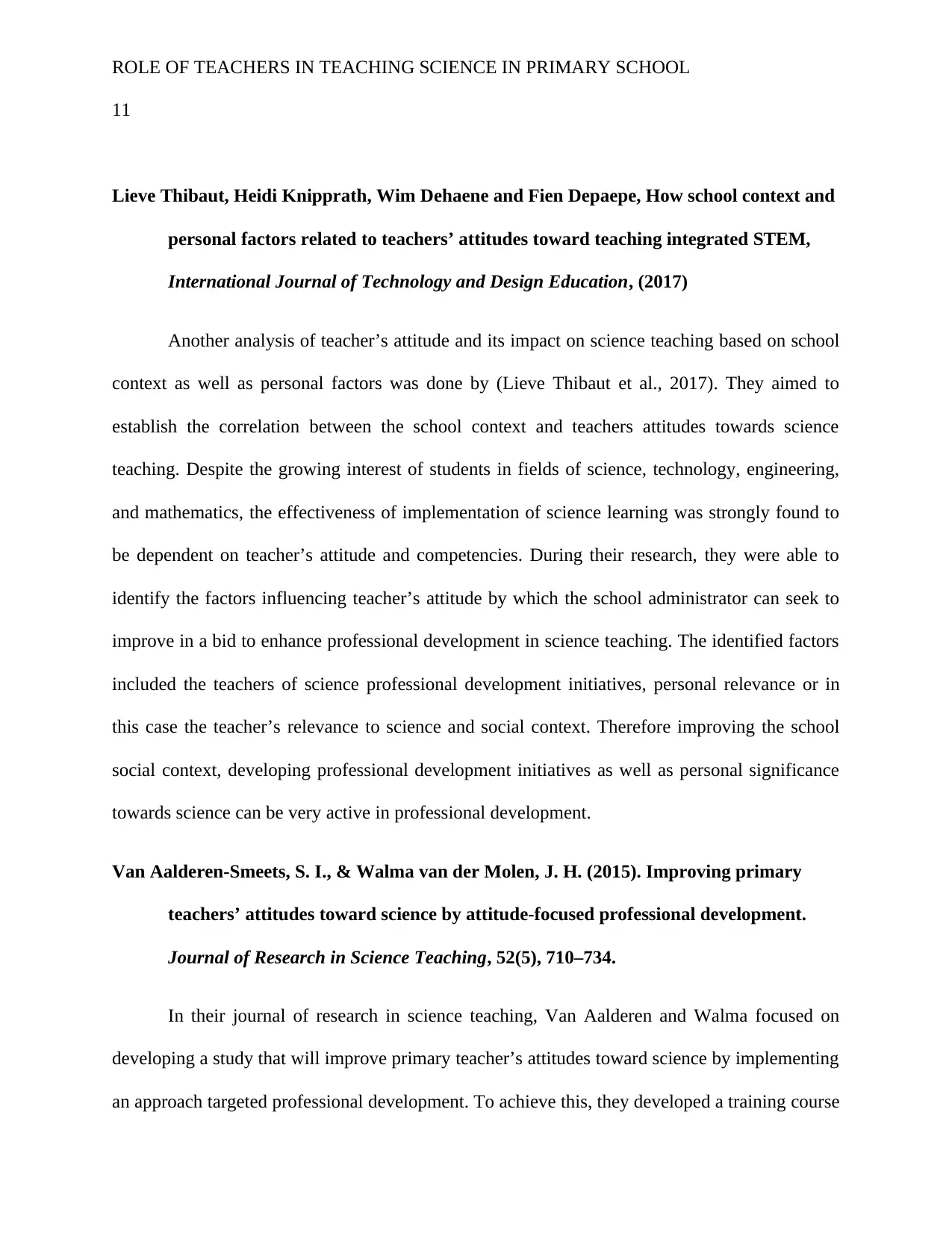
ROLE OF TEACHERS IN TEACHING SCIENCE IN PRIMARY SCHOOL
11
Lieve Thibaut, Heidi Knipprath, Wim Dehaene and Fien Depaepe, How school context and
personal factors related to teachers’ attitudes toward teaching integrated STEM,
International Journal of Technology and Design Education, (2017)
Another analysis of teacher’s attitude and its impact on science teaching based on school
context as well as personal factors was done by (Lieve Thibaut et al., 2017). They aimed to
establish the correlation between the school context and teachers attitudes towards science
teaching. Despite the growing interest of students in fields of science, technology, engineering,
and mathematics, the effectiveness of implementation of science learning was strongly found to
be dependent on teacher’s attitude and competencies. During their research, they were able to
identify the factors influencing teacher’s attitude by which the school administrator can seek to
improve in a bid to enhance professional development in science teaching. The identified factors
included the teachers of science professional development initiatives, personal relevance or in
this case the teacher’s relevance to science and social context. Therefore improving the school
social context, developing professional development initiatives as well as personal significance
towards science can be very active in professional development.
Van Aalderen-Smeets, S. I., & Walma van der Molen, J. H. (2015). Improving primary
teachers’ attitudes toward science by attitude-focused professional development.
Journal of Research in Science Teaching, 52(5), 710–734.
In their journal of research in science teaching, Van Aalderen and Walma focused on
developing a study that will improve primary teacher’s attitudes toward science by implementing
an approach targeted professional development. To achieve this, they developed a training course
11
Lieve Thibaut, Heidi Knipprath, Wim Dehaene and Fien Depaepe, How school context and
personal factors related to teachers’ attitudes toward teaching integrated STEM,
International Journal of Technology and Design Education, (2017)
Another analysis of teacher’s attitude and its impact on science teaching based on school
context as well as personal factors was done by (Lieve Thibaut et al., 2017). They aimed to
establish the correlation between the school context and teachers attitudes towards science
teaching. Despite the growing interest of students in fields of science, technology, engineering,
and mathematics, the effectiveness of implementation of science learning was strongly found to
be dependent on teacher’s attitude and competencies. During their research, they were able to
identify the factors influencing teacher’s attitude by which the school administrator can seek to
improve in a bid to enhance professional development in science teaching. The identified factors
included the teachers of science professional development initiatives, personal relevance or in
this case the teacher’s relevance to science and social context. Therefore improving the school
social context, developing professional development initiatives as well as personal significance
towards science can be very active in professional development.
Van Aalderen-Smeets, S. I., & Walma van der Molen, J. H. (2015). Improving primary
teachers’ attitudes toward science by attitude-focused professional development.
Journal of Research in Science Teaching, 52(5), 710–734.
In their journal of research in science teaching, Van Aalderen and Walma focused on
developing a study that will improve primary teacher’s attitudes toward science by implementing
an approach targeted professional development. To achieve this, they developed a training course
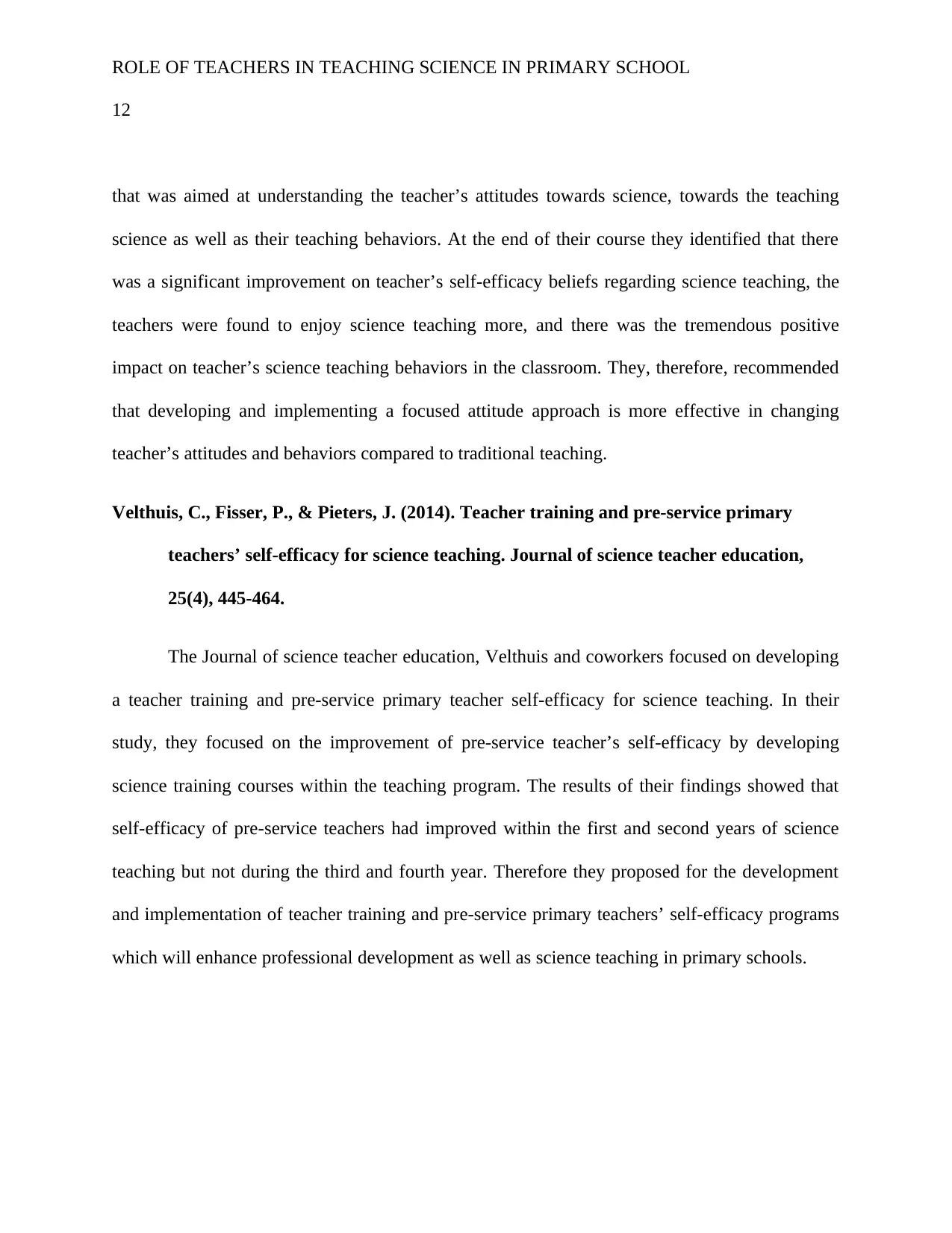
ROLE OF TEACHERS IN TEACHING SCIENCE IN PRIMARY SCHOOL
12
that was aimed at understanding the teacher’s attitudes towards science, towards the teaching
science as well as their teaching behaviors. At the end of their course they identified that there
was a significant improvement on teacher’s self-efficacy beliefs regarding science teaching, the
teachers were found to enjoy science teaching more, and there was the tremendous positive
impact on teacher’s science teaching behaviors in the classroom. They, therefore, recommended
that developing and implementing a focused attitude approach is more effective in changing
teacher’s attitudes and behaviors compared to traditional teaching.
Velthuis, C., Fisser, P., & Pieters, J. (2014). Teacher training and pre-service primary
teachers’ self-efficacy for science teaching. Journal of science teacher education,
25(4), 445-464.
The Journal of science teacher education, Velthuis and coworkers focused on developing
a teacher training and pre-service primary teacher self-efficacy for science teaching. In their
study, they focused on the improvement of pre-service teacher’s self-efficacy by developing
science training courses within the teaching program. The results of their findings showed that
self-efficacy of pre-service teachers had improved within the first and second years of science
teaching but not during the third and fourth year. Therefore they proposed for the development
and implementation of teacher training and pre-service primary teachers’ self-efficacy programs
which will enhance professional development as well as science teaching in primary schools.
12
that was aimed at understanding the teacher’s attitudes towards science, towards the teaching
science as well as their teaching behaviors. At the end of their course they identified that there
was a significant improvement on teacher’s self-efficacy beliefs regarding science teaching, the
teachers were found to enjoy science teaching more, and there was the tremendous positive
impact on teacher’s science teaching behaviors in the classroom. They, therefore, recommended
that developing and implementing a focused attitude approach is more effective in changing
teacher’s attitudes and behaviors compared to traditional teaching.
Velthuis, C., Fisser, P., & Pieters, J. (2014). Teacher training and pre-service primary
teachers’ self-efficacy for science teaching. Journal of science teacher education,
25(4), 445-464.
The Journal of science teacher education, Velthuis and coworkers focused on developing
a teacher training and pre-service primary teacher self-efficacy for science teaching. In their
study, they focused on the improvement of pre-service teacher’s self-efficacy by developing
science training courses within the teaching program. The results of their findings showed that
self-efficacy of pre-service teachers had improved within the first and second years of science
teaching but not during the third and fourth year. Therefore they proposed for the development
and implementation of teacher training and pre-service primary teachers’ self-efficacy programs
which will enhance professional development as well as science teaching in primary schools.
⊘ This is a preview!⊘
Do you want full access?
Subscribe today to unlock all pages.

Trusted by 1+ million students worldwide
1 out of 18
Related Documents
Your All-in-One AI-Powered Toolkit for Academic Success.
+13062052269
info@desklib.com
Available 24*7 on WhatsApp / Email
![[object Object]](/_next/static/media/star-bottom.7253800d.svg)
Unlock your academic potential
Copyright © 2020–2026 A2Z Services. All Rights Reserved. Developed and managed by ZUCOL.





